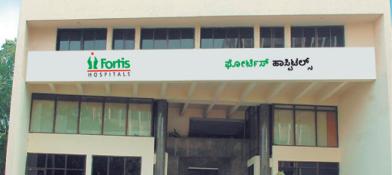Quad Screen
Overview:
A quad screen test is a prenatal blood test done on pregnant women. It checks for the probability of Down's syndrome in the growing baby. It is not a diagnostic test and does not diagnose Down's syndrome. It is a screening test that detects the risk of developing Down's syndrome in pregnancy.
The quad screen test detects four markers that indicate the risk of the development of Down's syndrome or genetic diseases in the foetus. It is done in the second trimester of pregnancy between the 15th and 20th weeks.
About Quad screen:
A quad screen test detects four markers in the blood of pregnant mothers. They are Alpha-feto protein (AFP), human chorionic gonadotropin (HCG), Estriol (a type of estrogen), and inhibin-A.
- hCG, a hormone made by the placenta
- Estriol is synthesised both by the placenta as well as the liver of the baby
- Inhibin-A is a hormone made by the placenta
- AFP, a protein synthesized in the baby's liver
This test is conducted between 15 and 22 weeks of pregnancy, but accurate results can be obtained between 16 and 18 weeks. The quad screen marker test is an optional test that parents can perform or not. However, healthcare providers always recommend it during pregnancy.
Analyzing these levels in the mother's blood helps to assess the likelihood of defects related to neural tube and the risk of developing syndromes in the baby. Abnormal levels of hCG and Estriol with high levels of inhibin A and abnormal levels of AFP are calculated with the mother's age, weight, baby's gestational age, and ethnicity to know the probability of genetic disorders.
A quad screen test is done to detect the risk of developing genetic disorders. The genetic disorders include:
- Down's syndrome (Trisomy 21)
- Edward's syndrome (Trisomy 18)
- Defects in the Neural tube
Indications:
Quad marker screen test is indicated in pregnant mothers:
- Family history of congenital disabilities
- Mother's age is 35 and more
- Mother has taken certain medications in pregnancy that can cause birth defects
- Mother had viral infections in pregnancy
- Mother is exposed to high radiation
- Mother has diabetes and is on insulin
Advantages:
Quad marker screen test has many advantages.
- It helps in the early identification of abnormalities in case of suspicion by screening
- It also predicts the development of preeclampsia in mothers
- It can also predict any adverse pregnancy outcomes like preterm labour, growth restriction of the baby, and premature rupture of the membranes.
- It can also detect complications that can arise in the mother or the baby to help devise strategies for better delivery outcomes.
- It also helps in the early identification of syndromes by screening
Before the test:
There are no special preparations for the test. The health care provider may enquire about the triple marker test done in the first trimester. One can eat normally before the test.
During the test:
The skin at the site where the blood is being drawn is carefully swabbed with alcohol. An elastic band is tied surrounding the arm. An individual must fold the fist to allow the easy flow of blood. Blood is drawn from a vein utilising a small needle. The required amount of blood is collected in a vial and sent to the lab for evaluation. The area is bandaged. The entire procedure takes about 10 minutes.
After the test:
One can continue daily activities after the test. Based on the results further investigations may be done to confirm the diagnosis. It takes about 4-5 days for the results to be obtained.
Interpretation:
A quad screen test checks for four markers in the blood. A standard quad screen test indicates that the baby is not at risk of developing any syndromes or anomalies. A positive test only means an increased risk of developing the anomaly. It does not detect the anomaly or syndrome. Further investigations have to be done to confirm the risk. Sometimes, a combination of the first and second-trimester screening tests is used to increase the accuracy of the results.
- AFP: Increased levels of AFP indicate neural tube defects like spina bifida, anencephaly, or an abnormality in the abdominal wall. It can also imply that one is farther in pregnancy than expected. Multiple pregnancies can also have high levels of AFP. Abnormally low levels of AFP indicate trisomy 21 or Down's syndrome.
- Estriol: Low levels of this hormone indicate that the baby can have the risk of Down's syndrome
- hCG: High levels of hCG indicate that there is an elevated risk of Down's syndrome in the baby.
- Inhibin-A: Higher levels of inhibin-A indicate that there is an elevated risk of Down's syndrome in the baby.
Accuracy of the Quad Test:
The quad marker screen test is only a screening test and is not 100% accurate. However, it is much more accurate than the triple screen test done in the first trimester. It can detect about 80-85% of cases of neural tube defects and Down's syndrome.
Risks and complications:
There will be slight pain and stinging sensation at the site of blood withdrawal, which subsides after some time. Quad marker tests can also give false-positive results, which can cause mental stress to the parents. It can lead to unnecessary further investigations, which can be economically and mentally draining.
Conclusion:
The quad screen marker test is done to screen for the development of any anomalies or abnormalities in the baby. It is a blood test done to check for specific proteins and hormones secreted by the mother and the baby. If the baby has any anomalies, it can help the parents prepare for events.
Popular Searches :
Hospitals: Cancer Hospital in Delhi | Best Heart Hospital in Delhi | Hospital in Amritsar | Hospital in Ludhiana | Hospitals in Mohali | Hospital in Faridabad | Hospitals in Gurgaon | Best Hospital in Jaipur | Hospitals in Greater Noida | Hospitals in Noida | Best Kidney Hospital in Kolkata | Best Hospital in Kolkata | Hospitals in Rajajinagar Bangalore | Hospitals in Richmond Road Bangalore | Hospitals in Nagarbhavi Bangalore | Hospital in Kalyan West | Hospitals in Mulund | Best Hospital in India | | Cardiology Hospital in India | Best Cancer Hospital in India | Best Cardiology Hospital in India | Best Oncology Hospital In India | Best Cancer Hospital in Delhi | Best Liver Transplant Hospital in India
Doctors: Dr. Rana Patir | Dr. Rajesh Benny | Dr. Rahul Bhargava | Dr. Jayant Arora | Dr. Anoop Misra | Dr. Manu Tiwari | Dr. Praveer Agarwal | Dr. Arup Ratan Dutta | Dr. Meenakshi Ahuja | Dr. Anoop Jhurani | Dr. Shivaji Basu | Dr. Subhash Jangid | Dr. Atul Mathur | Dr. Gurinder Bedi | Dr. Monika Wadhawan | Dr. Debasis Datta | Dr. Shrinivas Narayan | Dr. Praveen Gupta | Dr. Nitin Jha | Dr. Raghu Nagaraj | Dr. Ashok Seth | Dr. Sandeep Vaishya | Dr. Atul Mishra | Dr. Z S Meharwal | Dr. Ajay Bhalla | Dr. Atul Kumar Mittal | Dr. Arvind Kumar Khurana | Dr. Narayan Hulse | Dr. Samir Parikh | Dr. Amit Javed | Dr. Narayan Banerjee | Dr. Bimlesh Dhar Pandey | Dr. Arghya Chattopadhyay | Dr. G.R. Vijay Kumar | Dr Ashok Gupta | Dr. Gourdas Choudhuri | Dr. Sushrut Singh | Dr. N.C. Krishnamani | Dr. Atampreet Singh | Dr. Vivek Jawali | Dr. Sanjeev Gulati | Dr. Amite Pankaj Aggarwal | Dr. Ajay Kaul | Dr. Sunita Varma | Dr. Manoj Kumar Goel | Dr. R Muralidharan | Dr. Sushmita Roychowdhury | Dr. T.S. MAHANT | Dr. UDIPTA RAY | Dr. Aparna Jaswal | Dr. Ravul Jindal | Dr. Savyasachi Saxena | Dr. Ajay Kumar Kriplani | Dr. Nitesh Rohatgi | Dr. Anupam Jindal
Specialties: Heart Lung Transplant | Orthopedic | Cardiology Interventional | Obstetrics & Gynaecology | Onco Radiation | Neurosurgery | Interventional Cardiology | Gastroenterologist in Jaipur | Neuro Physician | Gynecologist in Kolkata | Best Neurologist in India | Liver Transfer | Best Cardiologist in Delhi






























